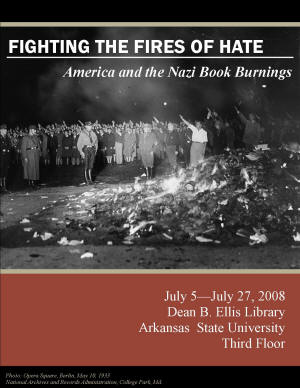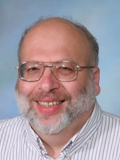University
Communications
Office
Arkansas State University
Jonesboro,
Arkansas
Staff
Markham Howe
Sara McNeil
Gina Bowman
(870) 972-3056
fax (870) 972-3069
More information:
NewsPage
Links to News Releases
& Announcements
Campus Calendar
Public activities at ASU
Campus News
Faculty and Staff
achievements
About
ASU
Overview, history
and more |
Library presents
exhibition from U.S. Holocaust Memorial Museum, program from ASU
professor
June 27, 2008 --
On Thursday, July 3,
the Dean B. Ellis Library at Arkansas State University will open a
traveling exhibition from the United States Holocaust Memorial Museum,
“Fighting the Fires of Hate: America and the Nazi Book Burnings.”
This exhibition provides a vivid look at the first steps the Nazis took to
suppress freedom of expression, and the strong response that occurred in
the United States both immediately and in the years thereafter. The
exhibition focuses on how the book burnings became a potent symbol
during World War II in America’s battle against Nazism, and concludes by
examining their continued impact on our public discourse.
exhibition provides a vivid look at the first steps the Nazis took to
suppress freedom of expression, and the strong response that occurred in
the United States both immediately and in the years thereafter. The
exhibition focuses on how the book burnings became a potent symbol
during World War II in America’s battle against Nazism, and concludes by
examining their continued impact on our public discourse.
Seventy-five years ago, just a few months after Adolf Hitler came to
power in Nazi Germany and a full six years before World War II, German
university students launched an “Action Against the Un-German Spirit”
targeting authors ranging from Helen Keller and Ernest Hemingway to
Albert Einstein and Sigmund Freud. Their orchestrated book burnings
across Germany would come to underscore German-Jewish writer Heinrich
Heine’s 19th century warning, “Where one burns books, one soon burns
people.”
In conjunction with this traveling exhibition, ASU professor Dr.
Lawrence Salinger, assistant department chair and associate professor in ASU’s Department of Criminology, Sociology, and Geography, will offer a
special presenta tion, “Survivors of the Shoah: Ursel Salinger,” on
Tuesday, July 8, at 5:30 p.m., Library, room 118. Salinger will present
a 1998 taped interview from the USC Shoah Foundation Institute for
Visual History and Education. The interview subject, Ursel Salinger,
grew up Jewish in Nazi Berlin. Dr. Salinger is her son. tion, “Survivors of the Shoah: Ursel Salinger,” on
Tuesday, July 8, at 5:30 p.m., Library, room 118. Salinger will present
a 1998 taped interview from the USC Shoah Foundation Institute for
Visual History and Education. The interview subject, Ursel Salinger,
grew up Jewish in Nazi Berlin. Dr. Salinger is her son.
April Sheppard, the library’s chair of the Library Programs and Exhibits
committee, notes, “The Shoah Foundation was established by film director
Stephen Spielberg in 1994, a year after he finished “Schindler’s List.”
He wanted to record
the testimonies of all the remaining Holocaust
survivors, and the foundation interviewed nearly 52,000 survivors.
‘Shoah’ is the Hebrew word for chaos, destruction, or catastrophe, and
is increasingly used as the term to denote the Holocaust. We thought Dr.
Salinger’s presentation, especially following the Fourth of July
holiday, when Americans celebrate their freedoms, tied in to this
exhibition in a very meaningful way.
Covered widely in the media, the Nazi book burnings provoked immediate,
strong reactions in the United States among writers, artists, scholars,
journalists, librarians, labor unions, clergy, political figures, and
others. Newspaper editorials and political cartoonists denounced the
bonfires. Newsweek magazine called it a “holocaust of books”; TIME
magazine, a “bibliocaust.” American writers including Helen Keller,
Lewis Mumford, and Sinclair Lewis – some of whose books had been
consigned to the flames – wrote open letters condemning the book
burnings. The American Jewish Congress organized massive street
demonstrations in more than a dozen U.S. cities to protest Nazi
persecution of Jews, using May 10 and the book burnings to broaden the
coalition of anti-Nazi groups.
“Americans were deeply offended by the book burnings, which were a gross
assault against their core values,” said United States Holocaust
Memorial Museum director Sara Bloomfield. “Their response was intense,
in fact so strong that throughout the war, the government used the book
burnings to help define the nature of the enemy to the American public.
Unfortunately, the systematic murder of Europe’s Jews was not seen as a
compelling case for fighting Nazism.”
As World War II progressed, President Franklin D. Roosevelt would evoke
the book burnings as a vivid example of the difference between a
democratic America and Nazi Germany. First Lady Eleanor Roosevelt
condemned the book burnings in her daily newspaper column. The
exhibition also focuses on how organizations ranging from the Library of
Congress, the American Library Association, the American Booksellers
Association, and the National Council of Women to the Writer’s War
Board, the Council on Books in Wartime, and the Office of War
Information used the 10th anniversary of the book burnings (in 1943) to
rally Americans around the war effort. The exhibition also documents how
the importance of books and the free marketplace of ideas were given
currency through the slogan, “Books Are Weapons in the War of Ideas,”
which appeared in posters, proclamations, radio broadcasts, and scores
of other outlets.
The exhibition concludes with the postwar years, exploring how the Nazi
book burnings have continued to resonate in American politics,
literature, and popular culture. It features post-war evocations of book
burnings, including a McCarthy-era speech in which President Eisenhower
urged Dartmouth graduates, “Don’t join the book burners”; films such as
“Pleasantville” and “Field of Dreams”; episodes of television
shows like “The Waltons” and “M*A*S*H”; the death threats against
Salman Rushdie; and the public burning of J.K. Rowling’s Harry Potter
books.
April Sheppard observes, “As the Fourth of July celebrations come to an
end, we have the time, as Americans, to reflect on what freedom means to
us. For some, freedom is in what we can say or what we can believe in.
For others, freedom is also represented in what we can
read. Seventy-five years ago, the Nazi book burnings were held.
Americans were shocked, outraged, and heartbroken. In a country built
on an idea, as America was, the book burnings were an unforgivable
offense. As Helen Keller wrote in an open letter to the Germans,
‘History has taught you nothing if you think you can kill ideas.’”
“Fighting the Fires of Hate: America and the Nazi Book Burnings,” will
run through Sunday, July 27. For more information on the exhibition,
contact April Sheppard at (870) 972-2766 or
asheppard@astate.edu. For
library hours, click
here. The Dean B. Ellis Library's main switchboard number is (870)
972-3077.
To view the online version of the exhibition, visit the United States
Holocaust Memorial Museum and go to the exhibition page, http://www.ushmm.org/museum/exhibit/online/bookburning/.
The United States Holocaust Memorial Museum is online at
http://www.ushmm.org/.
###
|
